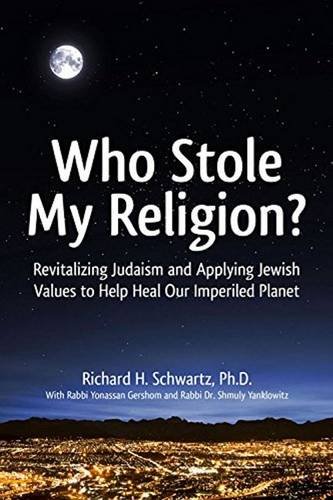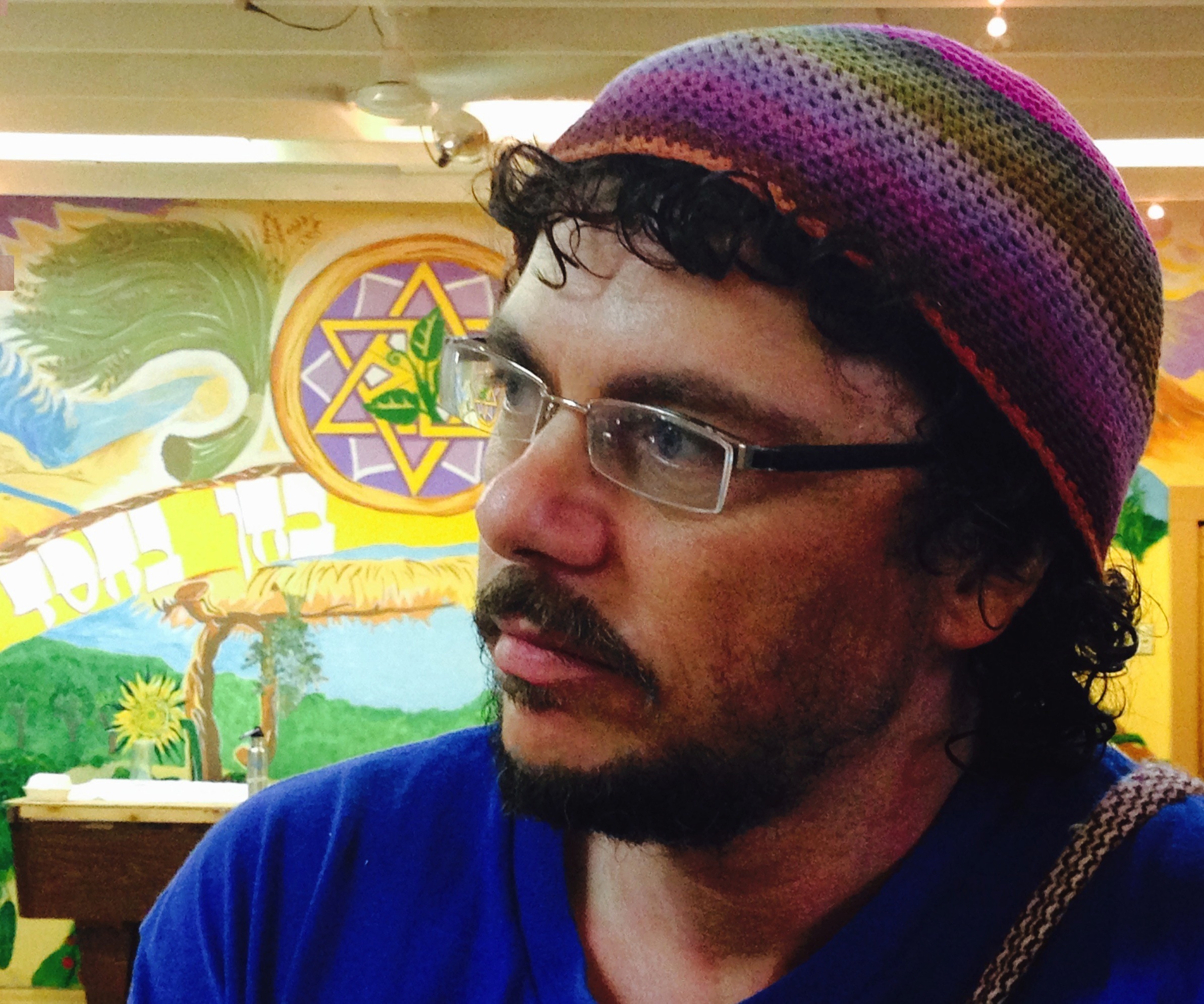Animals Subscribe
A selection of initiatives, blogs, resources and communities on Jewcology which focus on animals.
Blogs
10 Top Reasons to Read “Who Stole My Religion? Revitalizing Judaism and Applying Jewish Values to Help Heal Our Imperiled Planet”
Who Stole My Religion?: 1. Generates interest and discourse on the future of Judaism and our imperiled planet because of its challenging analyses. 2. Delivers a critical analysis of Orthodox Judaism’s views on climate change and politics. 3. Argues that vegetarianism, and especially veganism, is the diet most consistent with Jewish teachings and is essential to efforts to avert a climate catastrophe. 4. Offers a possible viable solution to the Israeli-Palestinian conflict. 5. Provides a radical approach to reducing terrorism. 6. Discusses how to ...
“Who Stole My Religion?” has been published!
HERE'S WHAT PEOPLE ARE SAYING ABOUT THIS UPDATED BOOK BY RICHARD SCHWARTZ. The many endorsements below are included to show that it is not just the author, but also many other people – of various perspectives – who think their religion has been “stolen,” but who still believe that religious values have relevance to current issues. It is our hope that the voices of the people who submitted the statements below, as well as many more voices, will be raised to help revitalize Judaism and other religions and to apply religious values effectively in response to the ...
Interview About My Activism and My Forthcoming Book
INTERVIEW ON MY APPROACH TO APPLYING JEWISH VALUES IN EFFORTS TO HELP SHIFT OUR IMPERILED PLANET ONTO A SUSTAINABLE PATH. INTERVIEW BY BATZION SHLOMI Batzion Shlomi: I understand you are making aliya soon! Mazal Tov! How did you come to this decision? Richard Schwartz: My wife and I have been considering making aliyah for many years, largely because we have two daughters living in Israel with their wonderful husbands and our marvelous grandchildren, and they have been strongly urging us to join them for a long time. We want to join them in the wonderful adventure ...
Restoring Eden: Behar and Bechukotai
The loss of Eden near the beginning of Genesis sets in motion the entire saga of the Torah. In fact, the Torah can be read as one long quest to regain Eden. But what does a restored Eden look like? One of Eden’s characteristics was that none of the animals ate each other, and, more specifically, human beings had no permission to eat any of the other animals. Instead, human beings and all the animals shared the plants for food. This motif of sharing and non-violence between species is used as a signal throughout Tanakh (scripture) to let us know when we are talking ...
Kosher Palm Oil
Until recently I thought I understood the problem with palm oil. I thought palm oil meant unethical agricultural practices causing the destruction of equatorial rainforests, driving Orangutans to extinction and contributing significantly to climate change. I believed that products where palm oil was listed as an ingredient are worse than those where palm oil is not listed as an ingredient. I understood that environment groups advocated boycotting manufacturers that use palm oil until they substituted with an alternative. And then I visited Melbourne Zoo where I listened ...
Shavuot and Vegetarianism
There are many connections between vegetarianism and the important Jewish festival of Shavuot: 1. Shavuot is described as "z'man matan Torateinu" (the season of the giving of our law (the Torah)). It is this Torah that has in its very first chapter God's original, strictly vegetarian, dietary regimen: "And God said: 'Behold, I have given you every herb yielding seed which is on the face of all the earth, and every tree, in which is the fruit of a tree yielding seed - to you it shall be for food'" (Genesis 1:29). 2. To honor the Torah, many Jews stay up the entire ...
A Shavuot Message: Applying Torah Values To Our Diets
Since Shavuot is z'man matan Torateinu (the commemoration of the giving of the Torah to the Israelites on Mount Sinai), many dedicated religious Jews admirably stay up the entire first night of Shavuot to hear talks about and discuss Torah teachings. Among these Torah teachings are that Jews should preserve human health, treat animals with compassion, protect the environment, conserve natural resources, help hungry people, and pursue peace. By becoming vegetarians, and preferably vegans, Jews would be partaking in a diet that is most consistent with these basic ...
Lag B’Omer & Vegetarianism (or Veganism): Making Every Day Count
By Daniel Brook & Richard H. Schwartz Lag B’Omer is considered a minor holiday in the Jewish calendar, but even a minor holiday is worth celebrating. A great way to celebrate Lag B’Omer is through veganism, as Lag B’Omer is deeply connected to veganism. If not quite ready for veganism, a shift to vegetarianism would be a great initial step. Lag B’Omer represents the 33rd day of the counting of the omer, the fifty days from Passover and Shavuot, reminding us of the link between these two holidays. While Passover celebrates our freedom from slavery, Shavuot ...
The Jewish Imperative of an Animal-Free Diet
Jeffrey Cohan, the Executive Director of Jewish Veg, is coming to Teaneck, NJ. He will be leading an hour-long, interactive presentation at Congregation Beth Sholom on the significance of Tza'ar Baalei Chayim (the Jewish mandate to prevent animal suffering) in our contemporary world. This event begins at 7 pm and is free and open to the public.
Is Eating Meat a Mitzvah that Comes from an Aveirah (Transgression)?
Judaism places much stress on performing mitzvot, carrying out God's commandments. However, a "mitzvah haba'ah b'aveirah" - a mitzvah based on an aveirah (sin or "illegitimate means") - is forbidden and is not considered a mitzvah. For example, if one uses a stolen lulav and esrog on Sukkot, it is not a proper mitzvah. Similarly, if money is stolen, it cannot be used to give tzedakah (charity). In fact, the sages indicate that it is better not to do the mitzvah at all than to do a mitzvah haba'ah b'aveirah. Eating meat is arguably a mitzvah haba'ah b'aveirah, actually ...
Lessons on Activism From the First Two Chapters of Genesis
Here are some of the important lessons on activism that I learned from the first two chapters of Genesis: 1. From Genesis 2:15, “the human being was put into the Garden of Eden to work the land and to guard (preserve) it,” I learned that I should be an environmental activist. This lesson was reinforced by Genesis 1:28, giving human beings “dominion,” because the Jewish sages interpreted dominion as responsible guardianship or stewardship. It is also reinforced by the following midrash (rabbinic commentary on the Torah): “In the hour when the Holy one, ...
The Vegetarian Writings of Rav Kook (Including Responses to Arguments Used Against Vegetarianism From His Writings)
Some of the strongest support for vegetarianism as a positive ideal in Torah literature may be found in the writings of Rabbi Abraham Isaac Hakohen Kook (1865-1935). An outstanding student of the Netziv of Volozhin and other Lithuanian Gedolim, Rav Kook was first Chief Rabbi of pre-state Israel and a revolutionary Orthodox Jewish thinker in the early 20th century. He was a profound mystic, innovative halakhist, prolific writer and poet, and one of the foremost Torah scholars of modern times. Rav Kook saw himself as a bridge between two worlds: the old world of the ...
Eighteen Reasons Jews Think They Should Not Be Vegetarian and Why They Are Wrong
1) The Torah teaches that humans are granted dominion over animals (Genesis 1:26), giving us a warrant to treat animals in any way we wish. Response: Jewish tradition interprets "dominion" as guardianship, or stewardship: we are called upon to be co-workers with God in improving the world. Dominion does not mean that people have the right to wantonly exploit animals, and it certainly does not permit us to breed animals and treat them as machines designed solely to meet human needs. In "A Vision of Vegetarianism and Peace," Rav Kook states: "There can be no doubt in the ...
Dialogue Between a Jewish Vegetarian Activist and a Rabbi
For a long time, I have been trying to start a respectful dialogue in the Jewish community. Because I have had very little success, I am presenting the fictional dialogue below. I hope that many readers will use it as the basis of similar dialogues with local rabbis, educators, and community leaders. Jewish Vegetarian Activist: Shalom rabbi. Rabbi: Shalom. Good to see you. JVA: Rabbi, I have been meaning to speak to you for some time about an issue, but I have hesitated because I know how busy you are, but I think this issue is very important. Rabbi: Well, that ...
Inconsistencies Between Animal-Based Diets and Basic Jewish Values
And God said: "Behold, I have given you every herb yielding seed which is upon the face of all the earth, and every tree that has seed-yielding fruit -- to you it shall be for food." (Genesis 1:29) There are many inconsistencies between basic Jewish values and the realities of animal-based diets: 1. While Judaism mandates that people should be very careful about preserving their health and their lives, numerous scientific studies have linked animal-based diets directly to heart disease, stroke, many forms of cancer, and other chronic degenerative diseases. 2. ...
The Surprising Views of the Rav (Rabbi Yosef Soloveitchik) on Vegetarianism
This article was written with the editorial asistance of Rabbi Dovid Sears Rabbi Joseph Ber (Yosef Dov) Soloveitchik, simply known as "the Rav" by his wide circle of colleagues, students, and admirers, was generally regarded as one of the leading religious philosophers, Talmud scholars, and rabbinic leaders of the 20th century. He stressed that Torah values were in many ways compatible with world culture and secular studies, and promoted Jewish interaction with the broader community -- while asserting the need to preserve the purity of halakhah (religious law) and the ...
Eden Village Camp is hiring a Farmer/ Educator
Eden Village Camp is Hiring! About Eden Village Camp: Eden Village Camp aims to be a living model of a thriving, sustainable Jewish community, grounded in social responsibility and inspired Jewish spiritual life. By bringing the wisdom of our tradition to the environmental, social, and personal issues important to today’s young people, we practice a Judaism that is substantive and relevant. Through our Jewish environmental and service-learning curricula, joyful Shabbat observance, pluralistic Jewish expression, and inspiring, diverse staff role models, we foster our ...
Why Perform a Rite That Kills Chickens as a Way To Seek God’s Compassion?
The period before and during Yom Kippur, Judaism's holiest day, is one in which Jews ask for God's compassion so that we will be forgiven for our transgressions during the previous year and granted a happy, healthy, peaceful new year. Yet, many Jews perform the rite of kapparot (in Ashkenazic Hebrew kappores or in Yiddish, shluggen kappores) in the days before Yom Kippur, a ritual which involves the killing of chickens. Kapparot is a custom in which the sins of a person are symbolically transferred to a fowl. First, selections from Isaiah 11:9, Psalms 107:10, 14, and ...
The Custom of Kapparot in the Jewish Tradition
Every year, before Yom Kippur (the Day of Atonement), some Jews perform the ceremony of kapparot. The following, in question and answer format, is a discussion of the ritual and its relation to the treatment of animals. What is kapparot [in Ashkenazic Hebrew or Yiddish, kapporos or shluggen kapporos]? Kapparot is a custom in which the sins of a person are symbolically transferred to a fowl. Some Jews practice it shortly before Yom Kippur. First, selections from Isaiah 11:9, Psalms 107:10, 14, and 17-21, and Job 33:23-24 are recited; then a rooster (for a male) or a ...








